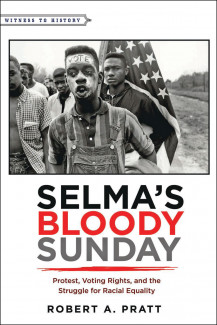
Johns Hopkins UniversityEst. 1876
America’s First Research University
Behind the book: Selma’s Bloody Sunday

I wanted to highlight the century-long struggle of African Americans to obtain the right to vote. The civil rights movement, sometimes referred to as the black freedom 
Although millions of African Americans were politically empowered with the passage of the Voting Rights Act, the 2008 election of Barack Obama as the nation’s first black president signaled to some that perhaps the Voting Rights Act was working too well. Shortly after Obama’s election, Republicans across the nation began to erect new barriers to voting that disproportionately affected the elderly, African Americans, and Latinos. Nearly every state—41 so far—has introduced some kind of restrictive voting legislation since 2008, and many states have succeeded in getting that legislation passed. Voter suppression has imposed new hardships on many segments of the American populace, and the U.S. Supreme Court’s 2013 decision in Shelby County, Alabama v. Holder that weakened portions of the 1965 Voting Rights Act has only emboldened Republican lawmakers to continue their efforts to limit citizens’ access to the ballot. The right to vote is as precious today as it was in 1965, and unfortunately, for an increasing number of Americans, almost as difficult to exercise. To make matters worse, President-elect Donald Trump’s complaints about “voter fraud” only legitimizes efforts to suppress the vote.
Interestingly, the recent election of Donald Trump adds yet another twist to this narrative. Post-election analysis shows that a majority of those eligible to vote in the 2016 presidential election did not vote, and if the post-election protests over Trump’s election are any indication, clearly there are some who perhaps did not vote who are now wishing that they had (not to mention those who voted for third party candidates Jill Stein and Gary Johnson—had Hillary Clinton received those votes she would have won the election). Ironically, Donald Trump’s election may indeed serve to energize an electorate that has been largely apathetic.
Robert A. Pratt is a professor of history at the University of Georgia. He is the author of The Color of Their Skin: Education and Race in Richmond, Virginia, 1954–89, We Shall Not Be Moved: The Desegregation of the University of Georgia, and his latest, Selma’s Bloody Sunday: Protest, Voting Rights, and the Struggle for Racial Equality.


